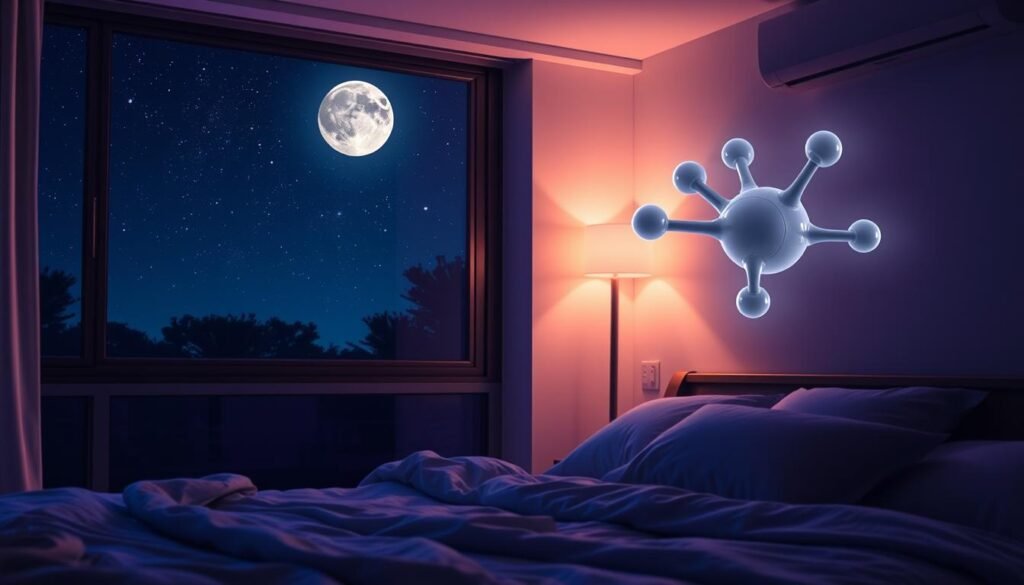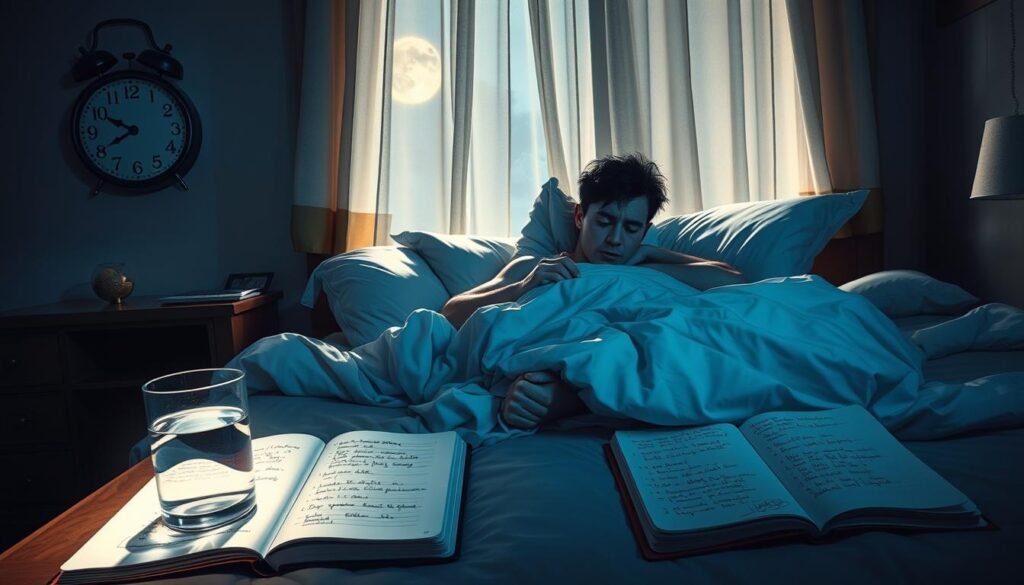Did you know that about 1 in 3 adults in the United States struggle with insomnia each year? This high number points to how hormonal imbalances affect sleep disorders. Hormonal insomnia is common in women during key life stages like pregnancy and menopause. Understanding how hormonal changes affect sleep quality is crucial.
This guide explores the hormonal causes of insomnia. It talks about specific hormones that mess up sleep patterns. Recognizing this condition’s complex nature is important. There are several ways to handle hormonal insomnia, including lifestyle changes, natural remedies, and professional help. Learn how hormonal changes and sleep disorders are connected. Tailored help can bring back restful nights. For more details, see expert advice on dealing with hormonal.
Key Takeaways
- Hormonal imbalances significantly contribute to sleep disorders, particularly in women.
- Insomnia symptoms can vary based on gender due to hormonal fluctuations.
- Stress plays a crucial role in disrupting hormonal balance and sleep quality.
- Natural remedies, such as melatonin supplements, can help improve sleep health.
- Understanding the impact of hormones on sleep is vital for effective treatment strategies.
Understanding Hormonal Insomnia
Hormonal insomnia is a big challenge for many. It often comes from hormonal imbalances. It affects our ability to sleep well. This leads to a growing interest in how it affects different people. Understanding hormonal insomnia means knowing how hormonal changes and sleep are connected.
Definition of Hormonal Insomnia
Hormonal insomnia makes it hard to fall asleep or stay asleep because of hormone levels changing. It messes with the sleep-wake cycle. This makes people feel tired even after sleeping all night. Studies show women are 40% more likely to have this problem. It’s often worse with the menstrual cycle, pregnancy, and menopause.
How Hormonal Imbalances Affect Sleep
Hormonal imbalances can ruin the sleep we need. For example, melatonin changes can mess up our sleep patterns. Stress makes cortisol levels go up, making sleep problems worse. Estrogen and progesterone are very important in women. They help control sleep quality at different times in life. These imbalances can cause tiredness and mood swings. This makes it hard to get good sleep.
Key Hormones Involved in Sleep Regulation
Hormonal balance is crucial in sleep regulation. Understanding the role of hormones like melatonin, cortisol, estrogen, progesterone, and testosterone can help us find out why some people have trouble sleeping. These hormones are part of a complex system that affects how well we sleep.
Melatonin: The Sleep Hormone
Melatonin tells our bodies it’s time to sleep. It’s a popular supplement in the U.S. for those having trouble sleeping. When it gets dark, melatonin levels rise, helping us fall and stay asleep. With proper melatonin levels, we often see our sleep improve.
Cortisol: The Stress Hormone
Cortisol affects our sleep. High levels from stress can make it hard to fall asleep and can interrupt sleep. In the morning, cortisol levels peak to keep us alert. They should decrease by night to help us sleep. High cortisol can lead to ongoing sleep problems.
Role of Estrogen and Progesterone
Estrogen and progesterone affect sleep, especially in women. Changes during menstrual cycles, pregnancy, and menopause can cause sleep issues. These hormone changes can affect body temperature and relaxation. Balancing these hormones may help sleep.
Impact of Testosterone Levels
Testosterone also affects sleep. It peaks during REM sleep. Less REM sleep can mean less testosterone, leading to snoring and insomnia. It’s important to keep testosterone levels balanced for good sleep. Changes can show hormone imbalances.

| Hormone | Function Related to Sleep | Potential Impact of Imbalance |
|---|---|---|
| Melatonin | Regulates sleep onset and maintenance | Difficulty falling and staying asleep |
| Cortisol | Increases alertness; peaks in the morning | Insomnia due to elevated stress levels |
| Estrogen | Regulates sleep, influences body temperature | Insomnia during hormonal fluctuations |
| Progesterone | Induces relaxation and supports sleep | Sleep disturbances in menstrual and menopause phases |
| Testosterone | Critical during REM sleep phases | Reduced REM sleep leading to insomnia |
Understanding how hormones affect sleep is key to solving sleep problems. Those with sleep issues should look into their hormone health. It might help to talk to a doctor about it. For more info on hormones and sleep issues, check out this link here.
Hormonal Causes of Insomnia
Hormonal changes greatly affect our sleep, hitting hard at different stages of life. This section looks into how menopause, pregnancy, and thyroid issues can cause sleeplessness.
Effects of Menopause on Sleep
Menopause brings a lot of symptoms that lead to insomnia. The shift in estrogen and progesterone sparks hot flashes and night sweats. This makes good sleep hard to get.
Women also deal with restless legs and mood swings. These issues interrupt sleep even more. Roughly 1 in 4 women struggle with insomnia during this time. Getting at least 7 hours of sleep is essential for them to feel rested.
Insomnia During Pregnancy
Pregnancy triggers major hormonal shifts, causing sleep issues. The discomfort of a growing belly, more stress, and needing to pee a lot disrupt sleep.
These hormone changes make it hard to sleep well, leading to day-long tiredness. Overcoming these sleep challenges is vital for the mom and baby.
Thyroid Disorders and Sleep Issues
Thyroid problems, like hypothyroidism and hyperthyroidism, impact sleep a lot. They throw thyroid hormone levels off balance, leading to sleep problems.
This is on top of the sleep issues already caused by menopause and pregnancy. People with these conditions often struggle with inconsistent sleep, making fatigue worse.
| Condition | Symptoms | Impact on Sleep |
|---|---|---|
| Menopause | Hot flashes, mood swings, night sweats | Increased difficulty falling and staying asleep |
| Pregnancy | Discomfort, anxiety, urinary frequency | Frequent awakenings, challenges maintaining sleep |
| Thyroid Disorders | Fatigue, anxiety, mood changes | Irregular sleep patterns, insomnia symptoms |
The Impact of Stress on Hormonal Sleep Disorders
Stress changes how we sleep, mainly by affecting our hormones. Lots of people have sleep problems because they’re stressed for a long time. Stress makes our cortisol levels go up. This makes it hard to sleep well.
Connection Between Long-Term Stress and Sleep Problems
Studies show stress-related insomnia can last for a short or long time. Long-term stress keeps cortisol levels high. This makes us too alert to sleep well. Key factors that stress messes with our sleep include:
- Physiological insomnia that gets worse
- Less activity in the stress-response system early in sleep
- More ACTH, which affects dream sleep
- Chronic insomnia lowering life quality
These points show how long-term stress hurts sleep. We need to understand this to manage stress better and sleep well.
Managing Stress for Better Sleep
Handling stress well can make our sleep much better. It can also balance our hormones. Good strategies are:
- Mindfulness to lower stress
- Exercise to loosen up and chill out
- Relaxation techniques, like deep breathing and muscle relaxation

Using these methods helps us sleep better and keeps our hormones balanced. People stressed all the time should focus on managing stress. This helps fix sleep problems caused by high cortisol, making us feel better overall.
Symptoms of Hormonal Insomnia
The symptoms of hormonal insomnia show up in many ways, affecting your overall health. People often find their sleep disturbed, which messes with their day, making them tired and less sharp. Learning about these symptoms is the first step to tackle the hormone-related issues causing them.
Common Signs of Sleep Disturbances
People with hormonal insomnia might notice several signs, such as:
- Difficulty falling asleep: It’s tough for them to start sleeping, which can be very upsetting.
- Frequent awakenings: Their sleep gets interrupted over and over, which ruins sleep quality.
- No restorative sleep: They wake up feeling tired, showing their sleep wasn’t deep or refreshing.
- Additional symptoms: Women may deal with hot flashes, night sweats, and more anxiety when their hormones are changing.
Differences in Symptoms Among Genders
Men and women experience hormonal insomnia differently. Studies show women have more sleep problems than men, especially during hormonal shifts. For instance, up to 60% of women going through menopause suffer from sleep issues. The figures for women before or during menopause vary between 16% to 47%.
Women face unique challenges during these times. Menopausal women, for example, often deal with symptoms that directly affect their sleep. Men might not have as many sleep issues, but when they do, they tend to hit hard.

| Gender | Prevalence of Sleep Disturbances | Common Symptoms |
|---|---|---|
| Premenopausal Women | 16% – 42% | Vasomotor symptoms, difficulty initiating sleep |
| Perimenopausal Women | 39% – 47% | Hot flashes, anxiety, sleep disruption |
| Postmenopausal Women | 35% – 60% | Subjective poor sleep quality, frequent awakenings |
| Men | Varies | Less subtle symptoms of sleep apnea, occasional insomnia |
It’s vital to understand these symptoms and gender differences. This knowledge helps tailor treatments that address hormonal insomnia. Thus, it improves sleep health overall.
Assessing Hormonal Imbalances
Learning to assess hormonal imbalances gives insight into why some people can’t sleep well. It involves several steps and tools. Health experts use different tests to find out what’s messing with sleep. Knowing these changes can help fix sleep issues like insomnia.
Diagnostic Approaches for Hormonal Testing
Blood tests are key for checking hormones. They look at cortisol, estrogen, progesterone, and testosterone levels. Finding out if these are out of balance can explain sleep problems. It might be due to stress or changes during sleep. Testing over time helps shape custom treatment plans.
Indicators of Hormonal Insomnia
There are signs that hormones could be causing sleep problems. If good sleep habits don’t help, it might be hormonal. Signs to watch for include:
- Feeling tired even after a long sleep.
- Having lots of mood changes or energy dips during the day.
- Finding it hard to fall or stay asleep due to stress.
- Dealing with hot flashes or night sweats that affect sleep.
Knowing these signs can lead to talks with a doctor about what to do next. For extra info on hormonal imbalance signs, check out this useful guide.
Treatment Options for Hormonal Insomnia
Finding the right treatment for hormonal insomnia involves different approaches. You can try lifestyle changes, natural remedies, and professional treatments. Each one helps improve sleep for those affected by hormonal changes.
Lifestyle Changes to Improve Sleep Quality
Adopting good sleep habits can greatly help with insomnia. Some key lifestyle changes are:
- Establishing a consistent sleep schedule
- Creating a relaxing bedtime routine
- Reducing caffeine and alcohol intake
- Avoiding late naps during the day
These changes can make a big difference in sleep quality. They are very helpful for anyone facing hormonal issues.
Natural Remedies and Supplements
Natural remedies can also improve sleep. For example, melatonin supplements can help with hormonal insomnia. Herbal options like black cohosh might also aid sleep issues caused by hormones. However, studies in 2019 found mixed results for herbal supplements for menopause. Still, some people benefit from aromatherapy, like using lavender essential oil.
Professional Therapies and Medications
If lifestyle adjustments and natural solutions don’t work, professional help may be needed. Cognitive-behavioral therapy for insomnia (CBT-I) is very effective. For severe cases, hormone replacement therapy might be required. Always talk to a healthcare professional for the best advice.
Combining these treatments can improve sleep and overall health. For more sleep tips, check out the recommended strategies for better rest.
Proactive Steps to Improve Sleep Hygiene
Improving sleep hygiene is key to handling insomnia, especially when hormones play a part. By following certain steps, you can get ready for a good night’s sleep. This leads to feeling refreshed every morning.
The Importance of a Regular Sleep Schedule
Keeping a regular sleep schedule helps set your body’s clock. It means going to sleep and waking up at the same time every day. This routine makes your sleep deeper and more refreshing.
Creating an Optimal Sleep Environment
Making your bedroom suitable for sleep is critical. A cool, dark, and silent space can help you relax better. Using blackout curtains, cutting down noise, and setting a comfy temperature can make a big difference. These changes can make sleeping much easier.
Mindfulness and Relaxation Techniques
Using mindfulness and relaxation methods can greatly aid those with insomnia. Deep breathing, yoga, or meditation can lower stress and bring peace at bedtime. These activities improve your health and prepare you for better sleep.
| Practice | Description | Benefits |
|---|---|---|
| Regular Sleep Schedule | Going to bed and waking up at the same time each day. | Regulates internal clock, improves sleep duration. |
| Optimal Sleep Environment | Maintaining a cool, dark, and quiet bedroom. | Fosters comfort, reduces distractions. |
| Mindfulness Techniques | Practices like yoga or meditation before sleep. | Reduces anxiety, promotes relaxation. |
Conclusion
Hormonal insomnia links hormones and sleep problems. It shows how estrogen, progesterone, cortisol, and thyroid hormones affect sleep. Understanding this helps us see what causes insomnia.
Many women struggle with insomnia during key life changes. These include menstruation, pregnancy, and menopause. Knowing the signs of hormonal swings helps us find the right solutions.
Making lifestyle changes and trying natural cures can help. Health experts can guide us in improving our sleep. By making smart choices, we can lessen hormonal effects on sleep. For more info, check out additional insights here.